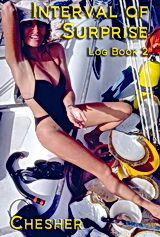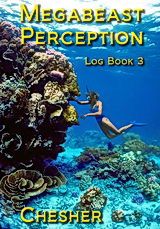MISSION TO TAGULA
When the unexpected happens, memory fails
At dawn, Freddy serves eggs and coffee in the cockpit while Bagaman Island burns.
From where we are anchored in the little pocket between the islands in the Calvados chain, it looks like half the island is in flames. Jimmy stands on the ridge above our anchorage, looking down at us, waiting for us to up sail and head out. Thick smoke curls behind him like a gray-black curtain fluttering up into the blue cloudless sky.
"I wonder why they are burning their island?" I muse as I sip the fresh ground PNG coffee.
"The village is thatch." Freddy comments. Does she mean that as an answer, or an observation the village is also likely to go up in flames? In either case, Jimmy, on the hill, thinks we are more interesting than the fire.
Yesterday, just as we rounded Bagaman Island and headed into the anchorage, we latched onto a big mackerel. Our freezer was already full of fish, so I chopped off the after end of the fish for our dinner and lugged the head end ashore to give away.
I saw a man wearing tattered old cut-offs and two women - one very young and the other very old - dressed in grass skirts, sitting on the beach watching us anchor. They would be able to get rid of the fish constructively.
But, when I headed for shore to give them the fish, they jumped up and vanished into the bush. There was a leaf lean-to at the top of the beach festooned with cowrie shells and feathers in early sorcerer decor. I hung the fish on a pole in the middle of all the witchy stuff and turned to go back to the dinghy. Jimmy was standing on the beach between me and the Avon, machete in hand, big feet planted firmly in the sand.
Turns out he could speak a very low level pidgin English. At first he worked on the complex project of ascertaining why I had left the fish hanging there. Who was it for? Why was I leaving it? And finally, was it poisonous? This was accomplished with lots of hand signs and facial expressions. I wished profoundly I had all of it on video.
The poisonous part was the hardest. I couldn't figure out what the hell he was trying to ask. We squatted on the edge of the camp and he went on and on, trying out his native language mixed with what little pidgin English he could apply. He even drew a stick figure in the sand. It meant nothing to me. Jimmy is not an artist.
At last it dawned on me, he simply could not believe I just stopped by to give him a fish for no reason. So, by his logic, there must be a reason. It is instructive the only reason he could think of was I wanted to poison him. Or so I thought. To reality test this assumption, I got up, walked over to the fish, took out my trusty swiss army knife, sliced off a hunk, and ate it. Then I smiled, and smacked my lips. I sliced off another piece and handed it to him. He sniffed it, touched it to his tongue, and finally, eyes locked on mine, ate it.
Still alive, he grinned, smacked his lips loudly to show he was delighted with the fish. The two women slowly crept out of the bush. Their enormous round eyes peered out of their ebony faces with a mixture of fear and awe.
Back in charade mode he wanted to know what he was expected to pay for the fish. I got it right away, after all, it is always the next question.
Freddy and I have long since learned a vital social lesson. In the islands it is very impolite to give something and take nothing in return. According to social custom, a gift must be reciprocated. If you give a gift worth more than the person can repay, it is a terrible embarrassment. The gift becomes an insult. The recipient either hates himself or hates the giver. Normally, it is much easier to hate anybody but yourself. And that's exactly what happens.
So, what could they give us in return for the fish? I had assumed people living on these little Calvados island must be seapeople. But, looking at them, I decided these were bush people. So the fish was something really special. Jimmy and I agreed he would go to his village and return with his gift. Something woman make. Basket. Something, anything. OK?
They vanished up the trail from the beach, fifteen kilos of half-fish swinging pendulously from a bamboo pole between them. I watched them go and thought about Dusty again, and the games people play with each other using their sophisticated words. These people, no doubt, play similar games with their own language. But although we had only a few words in common, we were able to get through the complexities of trust on the most basic of gestures and facial expressions. No matter what kind of human, what kind of language, what kind of social system, there is a biological network of signals older than humanity. We share many physical expressions of emotions and trust with chimps and gorillas. It dawns on me that we share them with a vast multitude of other creatures - dogs, cats, horses, and even dolphins. We can communicate with them if we try.
Freddy and I went pass diving. It looked like a perfect place for gold lips: a narrow, twisting deep pass between two islands. We stopped at the upwind side of the pass and I slid over the side and went down the anchor line hand over hand. The water was so clear I could see the entire width of the pass. The current was moving fast and when I unhooked the anchor, I thrilled along through the mysterious blue subsea canyon.
There was not a single gold lip oyster in the canyon.
When we got back and cleaned up, Jimmy arrived on the beach with his friends. I went ashore and picked them up and took them out to Moira. They had some crude palm-frond baskets filled with yams, and a rather nice woven basket.
"Roots," Freddy snorted undiplomatically. It's true they are stringy and not very good, but we could hardly refuse them. There was also a small stick of ebony. Jimmy called it Gavil.
Freddy and I made a big deal over the gifts and set them on the after deck. Everybody relaxed. They had repaid the Great Fish Debt. Jimmy and friends then turned their attention to Moira. They gaped and fingered and stood in absolute awe looking up the slender, 60 foot high mast. Finally, Jimmy breathed, "Stick break sky."
I showed him a gold lip shell. His eyes got big and round. He recognized it. Did they have any like these? No. Had he ever seen one before? Yes. Did his people ever find one? Not sure. Maybe. Did he ever find one in sea? No.
Of course Gold Lip normally live very deep so it is not surprising the islanders don't often find them. Which is, after all, why they are considered valuable.
I showed him a black lip pearl shell. These live in shallow water. Did he have any like these? Yes, plenty. Did he eat them? Yes. "Do you ever find pearls in them?"
"Peeaarlss?" He chewed on the word, obviously not knowing what I meant.
"Stone inside break teeth. Round. White." I explained.
He grinned, flicked his eyebrows yes.
"You bring stone inside this fellow I trade." I said. His face fell. Now what?
"You find stone belong this fellow what you do?" I asked, going through the charade of eating an oyster and finding a pearl.
He made an anguished face like he just bit into a pearl in an oyster and hurt his tooth. He reached inside his mouth, took out the imaginary pearl and heaved it over the side. Then he put a hand to his injured cheek.
"Pearl bad medicine?" I asked and the eyebrows flicked. "Pearls good for trade. You find pearl, you keep. Trade pearl. Sell pearl. Plenty good money. OK?" His eyebrows flicked yes.
I wanted to ask him how often he found pearls in black lip oysters. Freddy never leaves one untouched on the reef and has opened hundreds of them. She has never even found a miserable little seed pearl. But there was no way to get the concept of past time into hand gestures and facial expressions. I got the feeling they don't find pearls very often, either. But next time we pass by, they will have saved every one for us.
Now, this morning, Jimmy looks down at us from the flaming hill, obviously waiting to see Moira extend her shining white wings and fly away. Not a bad idea, actually. I drain my coffee cup, go forward, and click-clack up the anchor while Freddy fires up the diesel. We circle around into the wind and I hoist the big main. As we fall off, I unfurl the headsail. Up on the hill the islanders crowd the skyline.
"Probably the whole village," Freddy says, seeing the direction of my gaze. About 20 people, men, women, and children watch the ship, with the mast that breaks the sky, slide out into Sea.
Their island, and possibly their whole thatched village, burns behind them.



